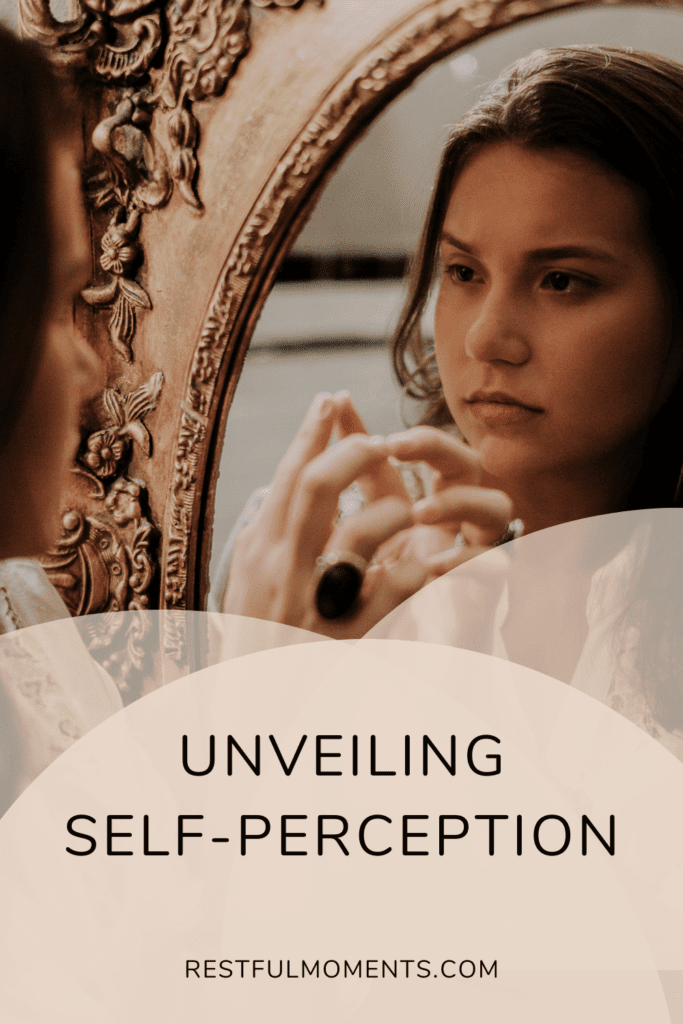In the ever-evolving landscape of personal development and self-improvement, the most important concept is self-perception. It’s the cornerstone upon which our thoughts, actions, and relationships build. Why is it so important?
Well, it affects not only our inner world but also how we engage with the outer world. This discussion applies to everyone, whether you’re looking to boost your career or someone on a quest for greater well-being.
In this post, I cover the influence of self-perception. It impacts our communication, personal growth, and problem-solving abilities.
How it can be both a catalyst and a barrier and how society perceptions play a role.
Understanding Self-Perception
Self-perception is how we view ourselves. It’s important because it affects how we think, act, and relate to the world around us. It has a great influence on how we experience life!
Positive and Negative Self-Perception
Some people wear glasses that make everything look sunny and clear – that’s a positive self-perception. Others wear glasses that make things seem cloudy and gloomy – that’s a negative self-perception.
The Positive
When you think you’re good at something and trust your abilities, that’s positive self-perception.
- You believe in yourself.
- You feel capable or valuable
- You’re ready to tackle challenges.
The Negative
On the other hand, negative self-perception is like having glasses that make you doubt yourself.
- You feel like you’re not good enough.
- You believe you don’t deserve good things.
- You think that you’ll fail if you try.
Negative self-perception can lead to tough problems like depression, anxiety, or low self-esteem.
Changing Self-Views with Feedback
Researchers found something interesting. A study discovered that when you receive feedback that doesn’t match how you see yourself, your self-image can change. 1Matsumoto, N., Katahira, K. & Kawaguchi, J. Cognitive Reactivity Amplifies the Activation and Development of Negative Self-schema: A Revised Mnemic Neglect Paradigm and Computational Modelling. Cogn Ther Res 47, 38–51 (2023). https://doi.org/10.1007/s10608-022-10332-x
Participants in this study were more sensitive to negative feelings (e.g. depression). Had a greater change in their self-image, even if it was positive.
This study shows how powerful self-perception is. It can even make people doubt themselves, no matter how much others say good things about them.
Let’s look at how external factors, like what others think of us. How it can shape our self-perception and why knowing about it is essential.

External Influence
Our self-perception isn’t solely formed by our own thoughts. It’s heavily influenced by the world around us.
Let’s look at how perceptions, opinions, criticism, shame, and blame play a role in shaping our self-perception.
The Study That Explored Parental and Teacher Beliefs:
A study called “The Role of Parents’ and Teachers’ Beliefs in Children’s Self-Concept Development” found some interesting connections. 2Laura Pesu, Jaana Viljaranta, Kaisa Aunola, The role of parents’ and teachers’ beliefs in children’s self-concept development, Journal of Applied Developmental Psychology, Volume 44, 2016, Pages 63-71, ISSN 0193-3973, https://doi.org/10.1016/j.appdev.2016.03.001.
It showed that children’s self-concept in subjects like reading and math is closely linked to their past performance. As well as what their parents and teachers believe about their abilities.
Put simply, the way important people in our lives view us can impact how we see ourselves.
If those people have confidence in us, it boosts our self-perception.
Societal Perceptions
Beyond our immediate circle, societal perceptions also have a big influence.
Society has its own opinions, often shaped by what we see in the media, hear from others, or read online.
For example, think about how the media portrays beauty standards.
We can not grow when we are in shame, and we can’t use shame to change ourselves or others. – Brenee Brown
Societal Expectations
Society sets expectations for us, too. It might expect us to follow a certain career path, have a particular lifestyle, or conform to specific norms.
When we don’t meet these expectations, it can lead to self-doubt and negatively affect our self-perception.
So, whether it’s the opinions of those close to us or the messages we get from society, external factors have a big say in how we perceive ourselves.
It’s important to be aware of these influences and understand how they can impact our self-concept.
Let’s explore the role of self-awareness. How we can reshape our self-perception despite these external pressures
Related article: How To Start Journaling For Self-Improvement
The Role of Self-Awareness
It’s incredibly important for personal development because it helps us understand who we are, what we believe, and why we act the way we do. Without it, we’d be navigating life in the dark.
Taking Control of Your Self-Perception
Now, here’s the exciting part: self-awareness gives us the power to take control of our self-perception.
When we’re aware of our thoughts and feelings, we can spot those moments when we doubt ourselves or overthink things. We can ask ourselves why we’re feeling this way and challenge those negative thoughts.
When we understand ourselves better, we can make healthier choices and build a more positive self-concept. Share on XYour Self-Perception, Your Responsibility
Remember, that you’re behind the steering wheel when it comes to your reality. You’re in control of your thoughts and feelings.
It’s not always easy, but you have the power to change how you see yourself.
You can break free from self-doubt and overthinking, two big roadblocks on the path to a positive self-concept.
In the next section, we’ll delve into practical ways to form a positive self-concept and explore why it’s crucial for our well-being.
Practical Steps to Forming a Positive Self-Concept
Forming a positive self-concept is a process that requires your self-perception and your habits. It can be transformative.
Let’s cover some practical steps to how you can shape a positive self-concept.
Adjust Your Self-Perception
One key step is adjusting how you see yourself.
When I began my fitness journey last year, I had to shift how I perceived myself. I started thinking of myself as someone who works out regularly.
When you tell yourself these beliefs, your brain looks for confirmation. Your brain wants to believe what you tell it.
Sometimes confirmation bias can be a good thing.
Master Your Routines
Habits and routines play a massive role in shaping your self-concept. Consider the power of daily habits, such as journaling.
When you make journaling a part of your routine, it can help you gain perspective on your life and boost your self-awareness.
Think about what habits can reinforce the self-concept you desire.
If you want to see yourself as a diligent learner, make reading or studying a daily habit.
Example of Self-Improvement
A shining example of self-improvement is Bob Proctor. He emphasizes how studying himself led to transformative changes in his life, turning him into the person he’s known as today.
His dedication to personal growth underscores the incredible potential within each of us.
By adjusting your self-perception, your perception of life will change.
Next, let’s look at how self-perception can serve as both a bridge and a barrier in communication.

Self-Perception Shapes Communication
If we see ourselves as confident and capable, our communication tends to reflect that. If we doubt ourselves, it can show in hesitant speech and uncertain gestures.
Filtering Information
Negative self-perception acts like a filter. It makes us focus on information that confirms our self-doubts, even if that’s not what others are saying.
This can lead to misunderstandings and misinterpretations.
Fear of Judgment
When we perceive ourselves negatively, we often fear judgment from others.
This fear can lead to hesitancy in expressing ourselves. Hindering effective communication.
Self-Fulfilling Prophecy
Negative self-perception can become a self-fulfilling prophecy.
If you believe you’re bad at public speaking, you might become anxious and stumble during presentations. Leading to a bad presentation and confirming your initial belief.
Understanding this relationship between self-perception and communication is crucial.
It reminds us that not only do our words matter, but our perception of ourselves matters too.
FAQs on Self-Perception, Self-Concept, and Communication
Can I change my self-perception if it’s negative?
Absolutely! While it can be challenging, you have the power to reshape your self-perception. Start by acknowledging negative thoughts and challenging them with positive affirmations. Surround yourself with supportive people and engage in activities that boost your confidence. Remember, change takes time, but it’s entirely possible.
How can I improve my self-awareness to enhance my self-concept?
Enhancing self-awareness involves regularly reflecting on your thoughts, feelings, and actions. Journaling, mindfulness practices, and seeking feedback from trusted individuals can help. As you become more self-aware, you’ll gain better control over your self-perception and, consequently, your self-concept.
What should I do if I notice self-doubt affecting my communication?
First, recognize that self-doubt is a common experience. When it surfaces, take a deep breath and remind yourself of your capabilities. Practice positive self-talk and focus on your strengths. Additionally, seeking communication skills training or guidance from a coach or therapist can help you build confidence in your interactions.
How can I handle societal perceptions that negatively impact my self-concept?
Addressing societal perceptions starts with critical thinking. Question societal expectations and beauty standards. Surround yourself with diverse perspectives and supportive communities that value individuality. Remember that you have the autonomy to define your self-concept, regardless of societal pressures.
What’s the link between self-concept and success?
A positive self-concept is often linked to greater success. When you believe in your abilities and worth, you’re more likely to set ambitious goals, take calculated risks, and persevere in the face of challenges. Your self-concept can be a powerful driver of achievement in various areas of life.
How does self-perception affect the way we talk to others?
Self-perception influences our confidence, which, in turn, affects our ability to express ideas clearly. If we believe we’re knowledgeable on a topic, we’re more likely to speak confidently about it.
Can self-perception impact how we interpret others’ messages?
Absolutely. Our self-perception can make us more sensitive to certain cues. For example, if we’re self-conscious about our appearance, we might interpret innocent comments about our looks as criticism.
Conclusion
In the journey of self-discovery and personal growth, one thing stands out—self-perception is guiding our path.
It influences how we see ourselves and how we communicate with the world.
Key Takeaways:
- Self-perception can be positive or negative. It significantly impacts our mental and emotional well-being.
- External factors, including opinions and societal standards, can shape our self-concept.
- Self-awareness is the bridge between self-perception and personal development.
- You have the power to change your self-perception and, in turn, your self-concept.
Embrace your unique qualities, strengths, and passions. Let your perception be a source of inspiration, not a limitation.
Believe in your potential, you have the ability to shape your life to your vision.
If you’ve found these insights valuable, you can explore more resources like this by looking at the related articles below.
I also don’t want this to be a one-sided conversation. Please share your thoughts, experiences, and questions in the comments below.
Your stories can contribute to, and inspire others!
- 1Matsumoto, N., Katahira, K. & Kawaguchi, J. Cognitive Reactivity Amplifies the Activation and Development of Negative Self-schema: A Revised Mnemic Neglect Paradigm and Computational Modelling. Cogn Ther Res 47, 38–51 (2023). https://doi.org/10.1007/s10608-022-10332-x
- 2Laura Pesu, Jaana Viljaranta, Kaisa Aunola, The role of parents’ and teachers’ beliefs in children’s self-concept development, Journal of Applied Developmental Psychology, Volume 44, 2016, Pages 63-71, ISSN 0193-3973, https://doi.org/10.1016/j.appdev.2016.03.001.
